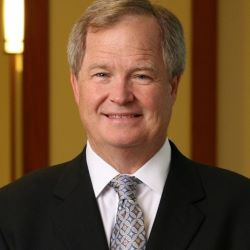Haymarket Center is thrilled to welcome Dr. Dan Sullivan to our Board of Directors. Dr. Sullivan has worked alongside Haymarket Center for more than five years as a member of the Leadership Council before joining the Board of Directors this summer. He has a long career in the healthcare industry, including serving as a clinical cardiologist at Elmhurst Memorial Hospital before moving to executive positions at Elmhurst Memorial Hospital, Edward Elmhurst Healthcare and Endeavor Health prior to his retirement. Dr. Sullivan joined Haymarket Center for a brief interview to introduce him to our stakeholders – like you!
Q: What initially got you interested and involved with Haymarket Center?
A: I saw that there was a need at Edward Elmhurst Health for more expansive treatment for patients with SUD, especially those who had unique challenges, like being under or uninsured. Then, Lee Daniels [the chairman of Haymarket Center’s Board of Directors] introduced me to Haymarket Center which could meet that need. I started a partnership with Haymarket to provide a more complete strategy, to make sure all of our SUD patients were able to get treatment.
Q: You’ve had a long career before getting involved with Haymarket Center, what experiences have you had that have prepared you for this involvement with Haymarket Center?
A: I have 33 years of direct clinical experience with patients as a cardiologist, but I also bring 10 years of executive leadership experience to the table. I focused on the strategy, design and implementation of patient care at the hospital level as well as for the broader medical group. When it comes to experience more specific to Haymarket’s mission, I served as executive sponsor for the Opioid Initiative at Edward Elmhurst Health for six years. I was responsible for how that initiative impacted internal programs and also collaborated with external organizations like Illinois Hospital Association, Haymarket Center, and other healthcare institutions.
Q: What excites you most about this new position on our Board?
A: As a member of Haymarket’s Board of Directors, I think I can help translate the needs of healthcare organizations regarding SUD treatment in a comprehensive way. It also gives me the opportunity to be a bridge to other organizations like I was with Edward Elmhurst Health.
Q: Even though you’re just joining our board now, you’ve been involved with Haymarket Center for over 5 years. Where would you like to see Haymarket Center 5 years from now, with your involvement?
A: I would like Haymarket Center to be seen more as an integral partner to healthcare organizations in need of substance use disorder services. I’ve seen the partnership between Edward Elmhurst Hospital and Haymarket Center as a great success, and I would like to see Haymarket Center have similar partnerships elsewhere. When it comes to treating patients with substance use disorders, patient success is the ultimate victory for everyone involved in the treatment process.
Q: There are so many misconceptions and assumptions surrounding SUD and the people who struggle with it. What is one misconception you hear most often, and how would you respond to it?
A: That once affected by SUD that person will always be a “weak link.” The truth is that successful treatment can lead someone who has struggled with substance use disorder to be one of the most solid and productive individuals in an organization and society as whole. There’s no reason to take recovery as something that puts someone at a permanent detriment.
Q: Outside of your career and involvement with Haymarket Center, what do you like to do? What hobbies do you have, or what’s your favorite way to unwind after a busy day?
A: I love anything I can do with my family, spending time with my 3 children and 4 grandchildren. I particularly like golf and biking, especially when I can do them with my family or significant other.
Q: If you could have dinner with anyone (alive or dead) who would it be and why?
A: My mother. She died when I was in my early 20s, before I had a real understanding of all that she had done for our family. She faced a lot of struggles with little help, and I would like the chance to express my gratitude for what she did and share some of my successes with her.
